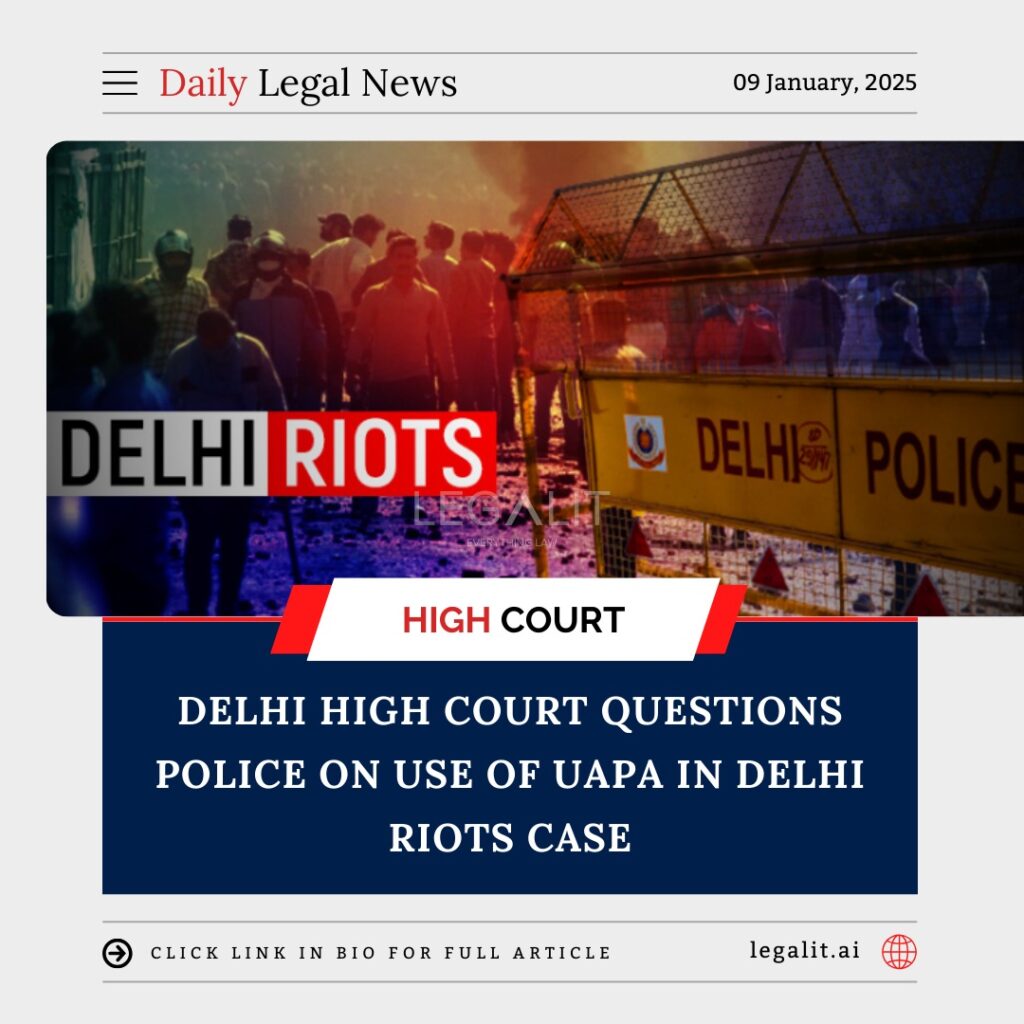
The Delhi High Court has raised crucial questions regarding the invocation of the Unlawful Activities (Prevention) Act (UAPA) in cases of organized protests, particularly in connection with the Delhi riots of 2020. The court sought clarity on whether mere participation in or organization of protests can meet the stringent criteria required for charges under UAPA.
Case Background
The case involves activists and students, including Umar Khalid and Sharjeel Imam, accused of inciting violence during the anti-Citizenship Amendment Act (CAA) protests in Delhi. The prosecution contends that their speeches and actions were part of a “larger conspiracy” that ultimately led to the riots, resulting in widespread loss of life and property.
The accused have been charged under UAPA, alleging that their activities were aimed at disrupting public order and threatening the sovereignty and integrity of India. The accused argue that the charges are an attempt to stifle dissent and criminalize legitimate protests.
High Court’s Observations
A division bench of Justice Siddharth Mridul and Justice Anish Dayal questioned the Delhi Police on the application of UAPA, specifically:
- Scope of UAPA Charges:
The court asked whether organizing or participating in a protest, even if it becomes disruptive, is sufficient to invoke the provisions of UAPA. - Intent to Overthrow Government:
The bench noted that for UAPA to apply, there must be a clear and direct intent to commit acts threatening India’s sovereignty or integrity, not merely to criticize the government or its policies. - Evidence of Conspiracy:
The court emphasized the need for substantial evidence to link the protests with a premeditated conspiracy to incite violence. - Balancing Dissent and Security:
While acknowledging the state’s duty to maintain public order, the court highlighted the constitutional protection of free speech and the right to protest, urging caution in criminalizing dissent.
Prosecution’s Arguments
The Delhi Police argued that:
- The accused made inflammatory speeches encouraging communal division and instigating violence.
- The protests were not spontaneous but part of a “meticulously planned conspiracy” to destabilize the government.
- The acts of violence during the riots demonstrated the execution of this larger conspiracy.
Defense’s Stand
The accused countered that:
- Their speeches and participation in protests were legitimate exercises of their democratic rights.
- The charges under UAPA are disproportionate and lack sufficient evidence of any intent to threaten national security.
- The prosecution’s case conflates dissent with sedition and terrorism.
Legal Standards Under UAPA
The UAPA is India’s primary anti-terrorism law, intended to address severe threats to the country’s sovereignty and security. To invoke UAPA:
- There must be a direct and deliberate intent to engage in terrorist activities.
- Acts must threaten the unity, integrity, or sovereignty of India.
Mere disruption of public order or participation in protests, without substantive evidence of intent or action to harm national security, typically does not meet the high threshold required under the law.
Implications of the Court’s Query
1. Safeguarding Democratic Rights:
The court’s questioning underscores the need to distinguish between dissent and terrorism, protecting citizens’ rights to protest.
2. Accountability in Law Enforcement:
By scrutinizing the application of UAPA, the court is ensuring that the law is not misused to suppress opposition or dissent.
3. Precedent for Similar Cases:
The judgment in this case could set a benchmark for assessing the validity of UAPA charges in future cases involving protests and public dissent.
Conclusion
The Delhi High Court’s deliberation on whether organizing protests is sufficient to invoke UAPA is a critical examination of the fine line between safeguarding national security and upholding democratic freedoms. The court’s eventual decision will likely influence the legal landscape surrounding protests and the use of anti-terror laws in India.